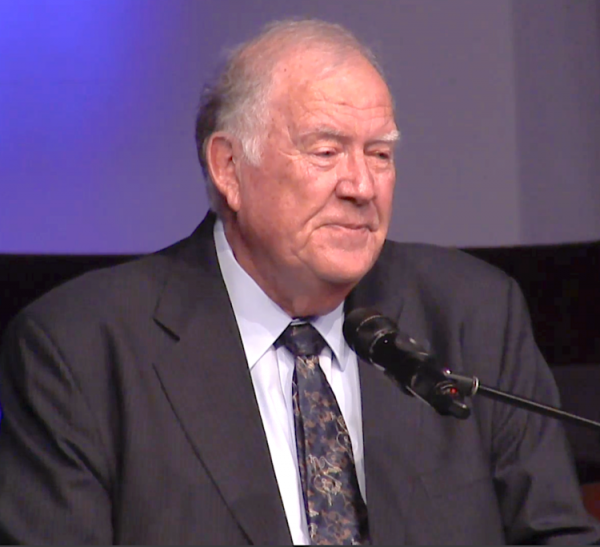Of Butterflies, Mathematics and Mulberry Trees
by Smuts van Rooyen | 26 March 2020 |
A few summers ago I attended the graduation of my son in Oregon, where he received an MFA degree in poetry. He already has a good job as a judge in the California Superior Court system, but it does not seem to fulfill all of his yearnings. The commencement speaker, a woman from Australia, recounted a conversation with a little girl she’d had while playing with her on the living room floor. The child unexpectedly held up her left hand and said to her,
“That’s five.”
“I already know that,” the speaker teased her.
Undeterred, the young one held up her right hand and said, “And that’s also five.”
Again the speaker joshed her with, “I already know that too,” then added, “And if you put two hands together that makes ten. Five and five equals ten.”
No, it doesn’t,” the little one objected. Then holding up her ten fingers together in a flapping motion said, “Five and five makes a butterfly!”
So which is the right answer to this finger-adding business? Butterflies or mathematics? In my view, both are right. One answer pertains to mathematics and the other to imagination, and we dare not discard either.
In mathematics we have a logical system that gives us access to hypotheses about the universe that we can then try to falsify by experiment. We cannot understand our world without it. Moreover, logic saves us from superstition and old husbands’ tales. It convinces us that to break a mirror does not result in seven years of bad luck, and that nothing untoward happens because a black cat walked under your ladder. Thank the Lord, we know what a non sequitur is!
But imagination is also crucial for living, because it urges us to attempt the impossible, to run in a new direction, to grasp beyond our reach, to see things in a new way, to see beauty as real, to exercise faith. Humans simply shrivel and die without it. We are programmed to imagine. This seems to me to be what Jesus meant by saying, “If you have faith as small as a mustard seed, you can say to this mulberry tree, ‘Be uprooted and planted in the sea,’ and it will obey you” (Lk 17:6). On the face of it, this is a ridiculous notion. There is no historical account of such a thing ever having occurred, and we all know that trees have no volition to obey human commands.
Nevertheless this is a clear invitation to consider the absurd option, to think outside the box, to allow our minds to go to that silly, undreamed of place, to conclude that five and five also makes a butterfly. The mulberry proverb is really much more about doing something with our own heads than with trees. It’s about finding the courage to say the wonderfully frightening words, “What if ….”
Try to imagine yourself looking the way you want to. Maybe a new mustache or a glam look. A tattoo? Well, maybe. Who knows? Imagine what life would be if you gave up your sense of inferiority, or your stubbornness, or your negative whatever. Imagine what you can do with wood and fabric, beads and sequins, words and music, string and sticks. Endless possibilities are out there for you to explore. But you cannot embrace any self-generated change until you have imagined it. Nothing is too outlandish to consider. What would others think? Who cares! We are intimidated by our own structures. We forge our own shackles.
The Romantics were a group of poets that reacted against the Enlightenment which was basically a new era of science that swept the world. They feared we were giving up our very ourselves by becoming wholly reasonable, logical, scientific. They emphatically rejected the notion that what cannot be measured cannot be true. I present a poem by William Wordsworth for your consideration. I hope you feel his outrage at our great loss. I hope you see what’s lost! Please don’t just brush it off as poetry but read it.
The world is too much with us; late and soon,
Getting and spending, we lay waste our powers;—
Little we see in Nature that is ours;
We have given our hearts away, a sordid boon!
The Sea that bares her bosom to the moon;
The winds that will be howling at all hours,
And are up-gathered now like sleeping flowers;
For this, for everything, we are out of tune;
It moves us not. Great God! I’d rather be
A Pagan suckled in a creed out worn;
So might I, standing on this pleasant lea,
Have glimpses that would make me less forlorn;
Have sight of Proteus rising from the sea;
Or hear old Triton blow his wreathed horn.
 Smuts van Rooyen is a retired pastor living in Central California. He holds an M.Div. and a Ph.D. in Counseling Psychology from Andrews University. His ministry was divided between teaching undergraduate religion and pastoring. He retired as the pastor of the Glendale City Church. He has been married to Arlene for a long time.
Smuts van Rooyen is a retired pastor living in Central California. He holds an M.Div. and a Ph.D. in Counseling Psychology from Andrews University. His ministry was divided between teaching undergraduate religion and pastoring. He retired as the pastor of the Glendale City Church. He has been married to Arlene for a long time.




